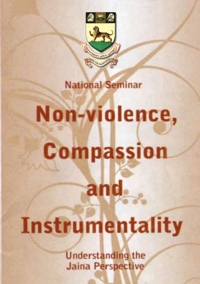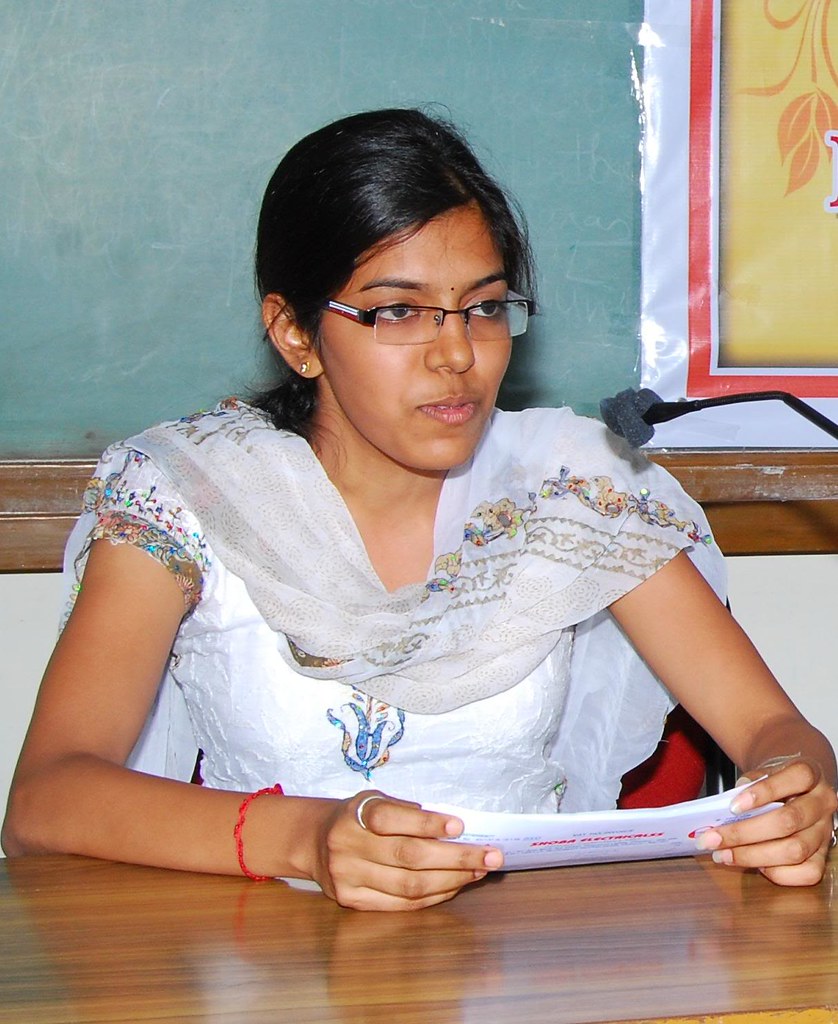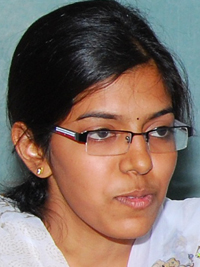Chennai 2009: Non-violence, Compassion and Instrumentality - A Jaina Perspective
 | Non-violence, Compassion and InstrumentalityA Jaina PerspectiveSeminar organized by the Department of Jainology of the University of Madras, 13 and 14 February 2009 Chennai, India |
13.02.2009
My Experience of Non-Violence
Violence - What does it mean?Does it just mean killing someone or beating someone, or is it lots more? The answer is yes... It’s lots more. You may hurt someone by just uttering a wrong word or a harsh word. You may hurt someone by just thinking wrong about someone.
We may have this doubt. How do I hurt someone by my thoughts? It’s all in my mind alone. This was the question that arose in me when I started to learn about Jainism the first time in my life and that wasn’t long back. It’s just about 7 months ago when I had this doubt. When I have not harmed anyone in reality then how can I be violent just with my thoughts alone?
Starting Point of Violence
My teacher explained this to me so beautifully and I would like to share the same with all of you - just imagine: Someone comes to us and hits us for no fault of ours. What happens?
Stage 1: We get angry.
Stage 2: We think of slapping the other person.
Stage 3: We physically slap him.
Stage 4: We have hurt the other person both physically and emotionally.
True isn’t it? Here we normally would consider the third stage as being violent. It is absolutely true that we become violent to the other person when we physically slap him. But what if I say violence has begun in the first stage itself. You may ask me how? When I get angry, am I not tensed? Doesn’t my blood pressure go up? Don’t I strain my mind and heart? Have I not lost the peace of my mind? Absolutely yes. I do all of this.
This had rung a bell in my mind. Even before I hurt the other person I actually hurt myself, I hurt my Soul.
Mahāvīra in the Bhagavatī Ārādhanā, 797 has said:
To kill any living being amounts to killing oneself.
Compassion to others is compassion to one's own self.
Therefore one should avoid violence like poison and thorns (which cause pain).
Have We Really Grown?Our life began with a 60 rupees toy car. When it broke we cried. Then we upgraded to a 2000 rupee remote controlled car. When that got damaged we wept. Then we were gifted the 20000 rupee battery operated car. When that stopped functioning we were depressed. Then came the 4 lakh car, after that the 22 lakh luxury car… And every time when something happened to this machine, whether a scratch or a dent, the mercury of our tensions and worries went up. And in all cases it seems that our toys have grown, but we ourselves haven’t. For what we cry has changed, but the crying is still on. Just that our crying is a lot more sophisticated now. It has many new names like anger, frustration, stress, nervousness, anxiety, etc.
Toys have only one purpose; to be useful to us. Just like this toy all the material things which we treasure and which we have got attached to, are here just for this single purpose - and that is to make our life comfortable. It is important to understand that YOU are more precious than everything you possess. YOU are bigger than them.
Likes - Are they temporary or permanent?
Realize that these likes would just give us pleasure for a temporary period. Then, is it worth to be so violent for something which is so temporary? Think. Think about this not just once but each time you feel you like or dislike something. Realize that all is just temporary. Evaluate if it is really worth it to be violent for any such impermanent likes and dislikes. Violent you may not be to anyone else, but you are surely being violent to yourself.
This brought a sea of change in my life. In a nutshell it just means: “Don’t be so attached to what you have because nothing is permanent, and don’t crave for anything which u don’t have.” We usually crave for all the latest gadgets and fashion stuffs. We want to have the latest mobile, the latest designer dress, want to watch the latest movie, and everything which is latest. But will that latest stay as latest for ever? No... not at all. At this point, I feel so enlightened, relieved, self-sufficient, selfless and compassionate; and this is because of the right understanding and application of the principle of non-violence, which was advocated not only by Lord Mahāvīra 2600 years ago, but since time immemorial the legendary Tīrthaṅkaras have preached the same in different time periods.
Techno-addict
We often react out of ignorance in most of the situations. Let it be the smallest happiness or the smallest grief. We feel so depressed even if the power goes off when we were just waiting for our favorite serial to start. In today’s world, even if our mobiles don’t catch network for sometime we get so disturbed. We literally start screaming at the customer care officer and blame that the company itself is awful. We become so restless while our computer takes time to start; while waiting at the elevator; while waiting at the traffic signals. Let’s give this a thought. Did this need so much of a reaction? It is so funny that we utter all the harsh words for all the network guys who try to help us, not realizing that we are harming none but ourselves. Stay calm. Remind yourself that the technology you are reacting for is just a value addition for life. It’s just a means to your life; and not life itself.
Check your reactions. Your reactions can never be non-violent, not only in adverse conditions but also in favorable ones too. Your desires are tested in favorable situations and your character in adverse situations.
In the name of Samayika
I have seen people doing samayika. It is also done with similar intentions - to keep the mind in rest and have control over the reactions. But what happens in reality is exactly opposite. The mother-in-law even before she completes her samayika is screaming at the daughter-in-law. The lady of the house even in her samayika is yelling at the maid who was late by 15 minutes. What is the real purpose of doing samayika and what happens in reality? It is so beautifully said - “He is happy whose circumstances suit his temper, but he is excellent and non-violent whose temper is not lost in any circumstance.”
Knowledge versus information
Today, man has lost himself in the wake of information and has lost his hand over knowledge. He gathers all possible information from all the sources. To make a presentation of two papers, he may log on to the net, to find pages and pages of links which may or may not have the required information. He doesn’t realize that he is overloading himself with information.
Knowledge is always information; but information may sparsely be knowledge.
Overloading of the senses
Knowing the world and knowing the selfIn this process, he overloads his sense organs too. Not only the information, but also the entertainment and sensual pleasures available, engrave the problem of sensory overload.
In the Isibhasiyam, Mahāvīra says:
The five senses of the awakened always remain inactive.
The five senses of the unawakened always remain active.
By means of the active five one acquires bondage while by
Means of the inactive five the bondage is severed.
Here again we may not be violent to any other being, but we are violent to our souls, to ourselves. We engross all our senses and bind the soul in the engulfing web of karmas, which is once again no less amount of violence.To quote Mahāvīra, in Śila-pahuda:
Objects of the senses pollute knowledge
If it is not protected by discipline.Once we learn to have a control over our senses, we may move a step ahead on the ladder of non-violence. Simple practices may lead to a better you:
- Sit in meditation daily
- Stay away from technology for at least an hour daily
- Watch only one news telecast per day
- Not forcefully read the newspaper
- Take time to be with nature on a regular basis
I have seen parents and the youth trying to engage themselves in as many courses as possible, to make them multi-talented and brilliant in all fields. To admit the truth even I was a participant of this rat race until a few months ago. I joined in any new course offered at the earliest. But once I joined this department I find it so fulfilling. I had learnt so much about the world previously but it is only now that I am knowing myself, knowing the real ME. It has made me spiritual and I am learning the art of Right Living; thus contributing my bit to save the environment. Through this very principle of non-violence, I am filled with compassion and contentment.
No offence to ones who have high dreams, but let us realize that we have got this precious birth of human beings - one among 84 lakh life forms. Could it have been easy for our souls to get this probable birth of a human being? Just imagine the probability one in 84 lakh. It’s a very costly life. We would never want to lose an expensive watch, and look at the irony - we care the least for the most expensive birth we have got.
Improvising - Slow, but a steady process
It is not that we would all improve ourselves in a single day. Even Amitabh Bachchan, Vishwanathan Anand, Sania Mirza must have undergone years of practice to come to their respective positions. It is just the practice of being non-violent which will make us happy in the long run. Being non-violent just not to others, but also to oneself, is equally important.
It is rightly quoted in the Ācārāṅga Sūtra (1/7/147):
One who knows the spiritual (self) knows the external (world) too.
He who knows the external world, knows the self also.
To rephrase the same it could be said: “If we can learn to be non-violent to the self, we would definitely be non-violent to others too, but the vice versa may not hold true.” - This is because one who is not violent to himself will never harm any other being.
My gratitude to my guru and the instruments (nimitta)
It has been a long way to reach this stage where at least I have become aware of various truths of life. And at this point I would firstly thank all those who have been instrumental in enabling me to reach this minimum state of realization at such a tender age and now I am confident to mould my future into a HARMLESS BEING - harmless to all the souls in this world; by treading on the path of NON-VIOLENCE - not just in deed and word but also in my thoughts.
Mahatma Gandhi once said - “Ahimsa is the attribute of the soul, and therefore, to be practiced by everybody in all affairs of life. If it cannot be practiced in all departments, it has no practical value”.
This realization has taken me to mindfulness from mindlessness. This realization has taken me to a non-violent me from a violent me. This realization has shown me the eternal bliss in place of the mundane pleasures. This realization makes me experience moksha here on earth itself. In fact this realization itself is nothing short of moksha for an ignorant soul like me. I know there is a lot to realize, a long way to go. I have made a humble beginning with the blessings of my revered gurus. Before leaving this dais I would like to wholeheartedly thank the head of the Jainology department as well as my very own teachers who with their efforts have organized this beautiful occasion where I could share on my experience with non-violence. If my words could make the smallest difference in any soul, which would be the gratitude I would be paying to their efforts.
Hence, I conclude with my prayer:
I do not desire anything other than my own self.
Let me remain stationed in my inner being, discarding all else.

 M. Vanitha
M. Vanitha